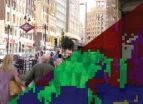(Press-News.org) New Haven, Conn.—Navigating our way down the street is something most of us take for granted; we seem to recognize cars, other people, trees and lampposts instantaneously and without much thought. In fact, visually interpreting our environment as quickly as we do is an astonishing feat requiring an enormous number of computations—which is just one reason that coming up with a computer-driven system that can mimic the human brain in visually recognizing objects has proven so difficult.
Now Eugenio Culurciello of Yale's School of Engineering & Applied Science has developed a supercomputer based on the human visual system that operates much more quickly and efficiently than ever before. Dubbed NeuFlow, the system takes its inspiration from the mammalian visual system, mimicking its neural network to quickly interpret the world around it. Culurciello presented the results Sept. 15 at the High Performance Embedded Computing (HPEC) workshop in Boston, Mass.
The system uses complex vision algorithms developed by Yann LeCun at New York University to run large neural networks for synthetic vision applications. One idea—the one Culurciello and LeCun are focusing on, is a system that would allow cars to drive themselves. In order to be able to recognize the various objects encountered on the road—such as other cars, people, stoplights, sidewalks, not to mention the road itself—NeuFlow processes tens of megapixel images in real time.
The system is also extremely efficient, simultaneously running more than 100 billion operations per second using only a few watts (that's less than the power a cell phone uses) to accomplish what it takes bench-top computers with multiple graphic processors more than 300 watts to achieve.
"One of our first prototypes of this system is already capable of outperforming graphic processors on vision tasks," Culurciello said.
Culurciello embedded the supercomputer on a single chip, making the system much smaller, yet more powerful and efficient, than full-scale computers. "The complete system is going to be no bigger than a wallet, so it could easily be embedded in cars and other places," Culurciello said.
Beyond the autonomous car navigation, the system could be used to improve robot navigation into dangerous or difficult-to-reach locations, to provide 360-degree synthetic vision for soldiers in combat situations, or in assisted living situations where it could be used to monitor motion and call for help should an elderly person fall, for example.
INFORMATION:
Other collaborators include Clement Farabet (Yale University and New York University), Berin Martini, Polina Akselrod, Selcuk Talay (Yale University) and Benoit Corda (New York University).
Find out more about NeuFlow and watch a video of the system in action at http://www.eng.yale.edu/elab/research/svision/svision.html
New supercomputer 'sees' well enough to drive a car someday
2010-09-16
ELSE PRESS RELEASES FROM THIS DATE:
Placebo successful in treating women with sexual dysfunction
2010-09-16
A new study published in the Journal of Sexual Medicine reveals that women with low sexual arousal experienced clinically significant symptom changes after taking a placebo.
Andrea Bradford, Ph.D., a psychologist at Baylor College of Medicine, along with co-author Cindy Meston, Ph.D. at the University of Texas at Austin, analyzed the behaviors and symptoms of 50 women who were randomly chosen to receive placebo in a large clinical trial of a drug treatment for low sexual arousal. Neither the women nor the study doctors knew whether they were taking the real drug or placebo.
Results ...
CEOs with top college degrees no better at improving long-term firm performance than other CEOs
2010-09-16
DURHAM, N.H. – Whether or not a company's CEO holds a college degree from a top school has no bearing on the firm's long-term performance. And when it comes to getting canned for poor performance, CEOs with degrees from the nation's most prestigious schools are no safer than the average CEO, according to new research from the University of New Hampshire.
Conducted by Brian Bolton, assistant professor of finance at the Whittemore School of Business and Economics at the University of New Hampshire, the new research is presented in the working paper "CEO Education, CEO Turnover, ...
Link to autism in boys found in missing DNA
2010-09-16
September 16, 2010 – (Toronto) – New research from the Centre for Addiction and Mental Health (CAMH) and The Hospital for Sick Children (SickKids), both in Toronto, Canada provides further clues as to why Autism Spectrum Disorder (ASD) affects four times more males than females. The scientists discovered that males who carry specific alterations of DNA on the sole X-chromosome they carry are at high risk of developing ASD. The research is published in the September 15 issue of Science Translational Medicine.
ASD is a neurological disorder that affects brain functioning, ...
Chef Point's 'Acquired Taste' Menu - A Walk on the Wild Side
2010-09-16
Oxtail, marinated in homemade spicy African seasoning, slowly cooked it until it falls off the bone. Where can you enjoy this delicious delicacy and other hard-to-find dishes? Only during a unique fine dining experience at Chef Point Cafe.
Franson Nwaeze, the head chef at Chef Point Cafe, has never been afraid to try something new. He is giving curious diners the opportunity to take a walk on the wild side with his new, one-of-a-kind "Acquired Taste" Menu.
The most popular dish on the special menu has been Liver and Onions. The dish of beef liver sauteed with mushrooms, ...
CiCi's Pizza Targets 500-Store Expansion Over the Next Six Years
2010-09-16
CiCi's Pizza, home of the $4.99 endless pizza, pasta, salad and dessert buffet, announces today its plans to add 500 restaurants in the next five to six years.
"Our 'One Brand' mission is well underway, ensuring we have a repeatable approach to operations that gives guests across the country a consistent, high-quality experience with every visit," said Mike Shumsky, CiCi's Pizza CEO. "Our team of industry leaders will take CiCi's to the next level and grow the company."
CiCi's has hired two industry veterans Bill Spae and Nancy Hampton to drive the expansion of the ...
Informatics = essential M.D. competency
2010-09-15
In an article published in the Sept. 15 edition of the Journal of the American Medical Association, (JAMA), author Edward H. Shortliffe, MD, PhD, points out that although information underlies all clinical work, and despite the growing role that information management and access play in healthcare delivery and clinical support, there is a dearth of informatics competency being developed in America's future corps of physicians. Formalized education in the application of informatics and the use and methodologies of health information technology and exchange, Dr. Shortliffe ...
A proven tool for losing weight: Reading food labels
2010-09-15
PULLMAN, Wash.—Diet and exercise have long been the top two elements of effective weight loss. Now add a third: reading the labels on packaged foods.
Washington State University Economist Bidisha Mandal has found that middle-aged Americans who want to lose weight and who take up the label-reading habit are more likely to lose weight than those who don't. In some cases, label reading is even more effective than exercise.
"I'm finding that reading labels is useful," said Mandal, an assistant professor in the WSU School of Economic Sciences. "People who are trying to lose ...
Learning to live on land: How some early plants overcame an evolutionary hurdle
2010-09-15
The diversity of life that can be seen in environments ranging from the rainforests of the Amazon to the spring blooms of the Mohave Desert is awe-inspiring. But this diversity would not be possible if the ancestors of modern plants had just stayed in the water with their green algal cousins. Moving onto dry land required major lifestyle changes to adapt to this new "hostile" environment, and in turn helped change global climate and atmospheric conditions to conditions we recognize today. By absorbing carbon while making food, and releasing oxygen, early plants shaped ecosystems ...
Glaciers help high-latitude mountains grow taller
2010-09-15
Glaciers can help actively growing mountains become higher by protecting them from erosion, according to a University of Arizona-led research team.
The finding is contrary to the conventional view of glaciers as powerful agents of erosion that carve deep fjords and move massive amounts of sediment down mountains. Mountains grow when movements of the Earth's crust push the rocks up.
The research is the first to show that the erosion effect of glaciers – what has been dubbed the "glacial buzzsaw" – reverses on mountains in colder climates.
The researchers were surprised, ...
Nature study shows how molecules escape from the nucleus
2010-09-15
September 15, 2010 – (BRONX, NY) – By constructing a microscope apparatus that achieves resolution never before possible in living cells, researchers at Albert Einstein College of Medicine of Yeshiva University have illuminated the molecular interactions that occur during one of the most important "trips" in all of biology: the journey of individual messenger Ribonucleic acid (RNA) molecules from the nucleus into the cytoplasm (the area between the nucleus and cell membrane) so that proteins can be made. The results, published in the September 15 online edition of Nature, ...






